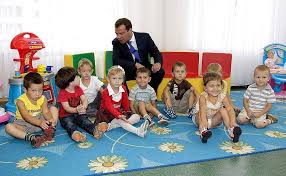16 November 2017
Pre-School Brain-Training
Brits need to look at other countries.
By Lynda Goetz

 When it comes to education, we in Britain tend to think (as indeed we do in many other areas) that we are leading the rest of the world. Sadly, when it actually comes down to it, there are many other countries from which we could be taking some lessons. Our overriding preoccupation appears to be with attainment and initially with the three Rs. Our belief that the earlier we start teaching these, the better the likely outcome, not only flies in the face of the facts, but almost certainly contributes to the stress of our children. In an international survey conducted last year by the Social Policy Research Unit at the University of York, British children came very near the bottom (13th out of 16) in a table rating the happiness of eight, ten and twelve year-old schoolchildren. Astonishingly perhaps to those of us who remember the days of horror stories from Romanian orphanages, Romania tops the list for children’s well-being.
When it comes to education, we in Britain tend to think (as indeed we do in many other areas) that we are leading the rest of the world. Sadly, when it actually comes down to it, there are many other countries from which we could be taking some lessons. Our overriding preoccupation appears to be with attainment and initially with the three Rs. Our belief that the earlier we start teaching these, the better the likely outcome, not only flies in the face of the facts, but almost certainly contributes to the stress of our children. In an international survey conducted last year by the Social Policy Research Unit at the University of York, British children came very near the bottom (13th out of 16) in a table rating the happiness of eight, ten and twelve year-old schoolchildren. Astonishingly perhaps to those of us who remember the days of horror stories from Romanian orphanages, Romania tops the list for children’s well-being.
In spite of a number of reports over the last few decades highlighting the benefits of pre-school being dedicated to aural learning and play, the increasing tendency in this country has been to subject nursery age children to the rigours of learning their letters and numbers and how to read and write; literacy and numeracy in other words. This has the effect of prolonging a process which in many other countries does not start until much later and which thus lasts for a much shorter duration.
 As some may be aware, many of the Scandinavian countries do not start formal schooling until seven. In this country it now starts at four. In Finland, ranked last year as the world’s most literate nation and at the top of Europe’s comprehensive school rankings for the last 16 years, they believe that “children under seven are not ready to start school. They need time to play and be physically active. It’s a time for creativity”. These were the words of Tiina Marjomieni, head of the Franzenia Daycare Centre in Helsinki, spoken to Guardian journalist Patrick Butler when he visited the centre last year for an article on Finnish Pre-school Education. The main focus of Finnish pre-school education is absolutely not formal learning, but the promotion of the well-being of the children and the introduction to ‘the joy of learning’ through both free-play and teacher-directed play. This has been shown to have greater long-term benefits for disadvantaged as well as privileged children.
As some may be aware, many of the Scandinavian countries do not start formal schooling until seven. In this country it now starts at four. In Finland, ranked last year as the world’s most literate nation and at the top of Europe’s comprehensive school rankings for the last 16 years, they believe that “children under seven are not ready to start school. They need time to play and be physically active. It’s a time for creativity”. These were the words of Tiina Marjomieni, head of the Franzenia Daycare Centre in Helsinki, spoken to Guardian journalist Patrick Butler when he visited the centre last year for an article on Finnish Pre-school Education. The main focus of Finnish pre-school education is absolutely not formal learning, but the promotion of the well-being of the children and the introduction to ‘the joy of learning’ through both free-play and teacher-directed play. This has been shown to have greater long-term benefits for disadvantaged as well as privileged children.
David Whitebread, director of The Centre for Research on Play in Development, Education and Learning at Cambridge University, is a great supporter of this approach to pre-school education and believes that play at this stage in development can engage children in the process of learning. He was one of the 130 signatories to a letter to The Daily Telegraph on 11th September 2013, which argued that the UK should consider this approach and concluded that ‘in the interests of children’s academic achievements and their emotional well-being, the UK government should take the (supporting) evidence seriously’. David Whitebread is part of the Too Much, Too Soon Campaign, which since that launch in 2013 has tried (without it has to be said much success) to move the UK government away from the current emphasis on pre-school literacy and numeracy in favour of creative and expressive play.
On 4th November a Telegraph article reported that two young Afghanistan war veterans, Oliver Holcroft and Rufus Gordon-Deane, believe they have perfected the way to ‘unlock a child’s genius’. Put that way, it apparently appeals to the celebrities and ‘tiger’ mums of Chelsea and Notting Hill, who have been signing up to the pair’s pre-school classes (Tarka London) in droves. The Telegraph would appear to be somewhat late in writing about the winning formula employed by Tarka, as Sophia Money-Coutts was drooling about the ‘handsome’ pair in Tatler way back in January and they have been going since 2015. However, what they are peddling is effectively exercise for pre-school kids. Why? Because most kids these days (privileged or otherwise) do not get enough of it and it is exercise and play (not the ability to read at three) that is crucial to children’s development, as the Scandinavians have long since shown.
 The founders of Tarka (what a great name) acknowledge the debt they owe to the Scandinavian approach to pre-school education, and their web-site contains facts and figures to back up their claim of providing ‘structured exercise to promote cerebral development’. In a page on the University of Cambridge website School starting age: the evidence David Whitebread sets out a review of the research evidence, which alongside other studies and the Scandinavian success stories, really does appear to provide all the support one might want or need to shift the emphasis in our nurseries and early school years. In spite of this, campaigners still have a fight on their hands to get ministers to abandon Baseline Assessment for 4 year-olds (Better without Baseline). The pilot plan to assess children going into Reception was abandoned in April 2016, but as recently as 14 September the government in its plans for the future of primary assessment has once again included the idea of tests for 4 year-olds – opposed not only by those who believe the Scandinavian way is better and healthier, but by many of the primary school teaching staff. As our worldwide rankings in terms of both attainment and mental and physical well-being fall lower and lower, why are we increasingly obsessed with testing children and why can those in government not listen to the experts and look around the world to see how others can, at least sometimes, do things better than we do?
The founders of Tarka (what a great name) acknowledge the debt they owe to the Scandinavian approach to pre-school education, and their web-site contains facts and figures to back up their claim of providing ‘structured exercise to promote cerebral development’. In a page on the University of Cambridge website School starting age: the evidence David Whitebread sets out a review of the research evidence, which alongside other studies and the Scandinavian success stories, really does appear to provide all the support one might want or need to shift the emphasis in our nurseries and early school years. In spite of this, campaigners still have a fight on their hands to get ministers to abandon Baseline Assessment for 4 year-olds (Better without Baseline). The pilot plan to assess children going into Reception was abandoned in April 2016, but as recently as 14 September the government in its plans for the future of primary assessment has once again included the idea of tests for 4 year-olds – opposed not only by those who believe the Scandinavian way is better and healthier, but by many of the primary school teaching staff. As our worldwide rankings in terms of both attainment and mental and physical well-being fall lower and lower, why are we increasingly obsessed with testing children and why can those in government not listen to the experts and look around the world to see how others can, at least sometimes, do things better than we do?
If you enjoyed this post please share it using the buttons above.
Please click here if you would like a weekly email on publication of the ShawSheet

